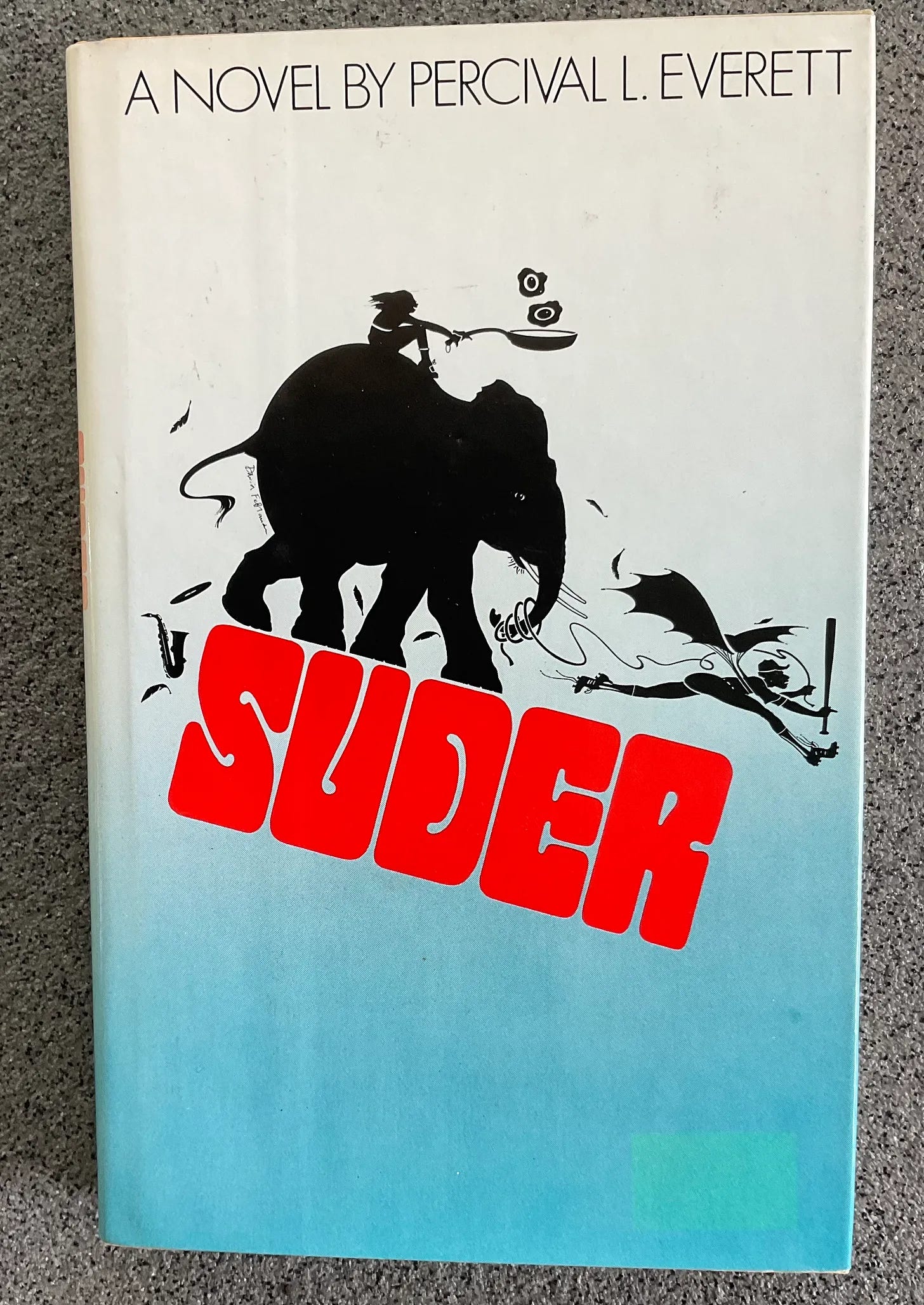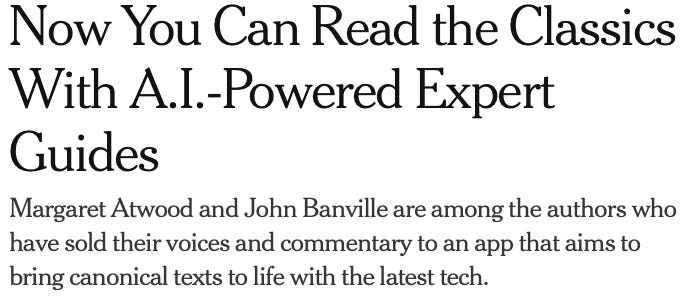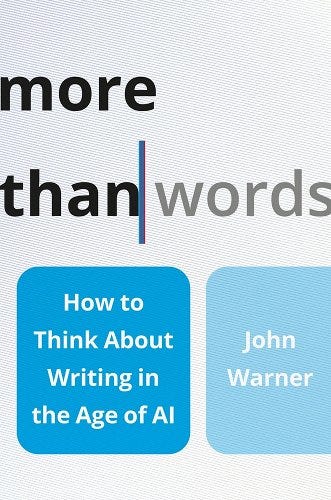I recently had a chance to go see and hear Percival Everett “in conversation” at an event here in Charleston, South Carolina where I live. I could have gone, my schedule was free (it’s always free), but I didn’t go, and I’ve been wondering why.
In 2017, writing in my column at the Chicago Tribune I declared Everett the most interesting writer working today, a sentiment I’d held for years before I put it publicly into print. Everett’s public reputation has only grown since thanks to the stunning noir/satire, The Trees, and this year’s retelling of Huck Finn, James. I own several first edition hardcovers of his books, including his first novel Suder, about a slumping Seattle Mariners third baseman who goes on a picaresque adventure with his saxophone during a leave of absence, and Erasure, the source material for last year’s Academy Award winning film, American Fiction.
My copy of Erasure has become genuinely valuable, and the author’s signature would only make it more so, I assume, not that this matters since I don’t foresee a circumstance in which I’d sell the book.
By all rights, I should’ve been eager to go see and hear and the man, maybe have him sign those books and exchange a few words. I thought it would be a good event - Everett is an experienced public presence and obviously very funny - a suspicion confirmed by a friend who attended, but when I searched my desires, I decided that I’d rather sit this one out.
It was not the first time I’d actively avoided the chance to interact with a writer whose work I admired. Charleston has a literary festival every year that brings some big-time names to town, and I’ve never gone. I think Lorrie Moore was here last year. (I fawned over I Am Homeless if This Is Not My Home last year.)
Back in 2011 I was part of the Clemson literary festival, reading at a satellite event prior to a headlining appearance by Richard Ford. I was once so taken by Ford’s The Sportswriter in graduate school that I tried to write a novel that was essentially an imitation of it in terms of narrative voice and tone. I was at a post-reading event with a smattering of the writers who participated, including Ford, who was chatting amiably with others, and it would’ve been nothing to go up and introduce myself and express my admiration, but I didn’t do it. I can be a little shy, but that’s not really what’s at work here, at least I don’t think so.
It is hard to overstate how much books mean to me. I’ve written in the past about how books gave me the world as a child, and it’s never really changed as I’ve grown. I love books, but also, here’s what I’m thinking…I’m suspicious of this love of people’s books turning me into a “fan” of the writer themselves.
Fandom is intense, fandom is emotional, and a vector for disappointment. I am a fan of the Chicago sports franchises. When the Cubs finally won the World Series in 2016, I spontaneously burst into tears, alone in my living room, early in the A.M. Being a fan requires a commitment to stay true even through not just disappointment, but even something like neglect. Two seasons ago, the Chicago Blackhawks assembled a roster veritably designed to lose as many games as possible in the hopes that they would land generational superstar Connor Bedard in the draft. When the team was putrid, we were nonetheless required to show loyalty.
Maybe I would’ve done something to irritate Richard Ford (unintentionally, one hopes), and he treated me poorly. Ford is famously thin-skinned about criticism, having once taken one of Alice Hoffman’s books out back and shooting a hole through it before mailing it to her because of one negative review, and even spitting on Colson Whitehead at a party two years after another negative review.
I didn’t fear similar treatment - though I knew of these incidents at the time - but maybe some part of my psyche suggested it’s enough to just have once been moved by the books, and not have to involve myself with the person.
Maybe I just didn’t want to be disappointed.
In graduate school, I made the mistake of over-investing in the importance of my major professor, Robert Olen Butler, to my future fate as a writer. He had just won the Pulitzer Prize for a book I’d been stunned by (A Good Scent from a Strange Mountain) and was complimentary of my talent when he offered me a place in the program at McNeese State University. Before I ever arrived on campus, I’d invested guru status into him, setting myself up for inevitable disappointment. My goal for the first year and a half was to please Bob, but trying to write while wondering if some very specific other person is going to approve of what you’re doing is not a recipe for success.
That Bob was not obligated to be my guru dawned on me eventually, but I’d wasted some time and built up some measure of resentment, wondering why he couldn’t or wouldn’t anoint me. Bursting that bubble for myself gave me the space to admit that Bob Butler had written some wonderful books and some less than wonderful books, and that how I related to the books ultimately meant much more to whatever kind of writer I was going to become.
Don’t want to be a “fan,” don’t need a guru. Also don’t want to be a guru. When Why They Can’t Write and The Writer’s Practice were coming out I got some advice from an ex-teacher who had transitioned into speaking and professional development, a path I was considering for myself. They said the way to really gain traction was to not encourage engagement with my ideas necessarily, but with my person, or rather my persona, my brand. Don’t get me wrong, this person’s work is substantive. They weren’t on a “grift” or encouraging me to engage in a grift, where grifting means promising something inconsistent with what you’re delivering.
I was getting marketing advice on what would sway people to want to try the approach to teaching writing that I was advocating for. These things are enormously complicated and because of that people crave an answer, and to succeed, I had to position myself as someone uniquely capable of delivering answers (or “solutions” in corporate speak). The ideas weren’t immaterial, but they didn’t really matter.
I knew I wasn’t comfortable with that. Don’t get me wrong, my approach works great, but only if you come from a similar set of values around teaching and are willing to continue to wrestle with complexity is the approach going to work for you. I wasn’t willing to promise a solution or cure. I thought I had something worth thinking about, that’s all.
By resisting becoming a fan of writers, instead of being interested in their writing, I’ve saved myself a lot of disillusionment and disappointment. Off the top of my head I can think of three writers (Lionel Shriver, Walter Kirn, and Meghan Daum) whose books I’ve publicly declared as among my favorites, and who are now, by disposition, and even to some degree by profession, “anti-woke.” Their views are all sincerely held, but also, from my perspective, when compared to what was evidenced in their previous work, predictable and dull. I do not get that same thrill out of their work as I once did.
And that’s okay! I’m a reader, not a fan, so they owe me nothing. I can’t be betrayed. We all get to live our lives as free people. What could be better?
Even after getting a pretty detailed recap of the Percival Everett event, I didn’t have the sense that I’d missed something I needed. Maybe it would’ve been cool or fulfilling to meet the man who wrote these books I so admire, but in the end, I already have the most important thing.
I’ve got the books.
Links
This week at the Chicago Tribune I weigh in on Costco hot dogs, and also the disappointing announcement that they’re going to stop stocking books year-round.
Also in John Warner creates content, at Inside Higher Ed, I argue that calls to train students on using generative AI as a “co-pilot” instead invites them to use the tech as a “subcontractor” which disrupts their learning. At my
newsletter, I argue that the genAI-powered historical figure chatbots are a bad idea for myriad reasons.I didn’t go see Percival Everett in person, but I did listen to this interview on the Colin McEnroe show.
A planned biography of Tucker Carlson was dropped by the publisher reportedly because of Carlson’s declining relevance.
V.V. Ganeshananathan won the Women’s Prize for fiction for her book, Brotherless Night. Naomi Klein took the nonfiction prize for Doppelgänger.
I do not know what this is:
Colin McEnroe, the above interviewer of Percival Everett is also the author of one of the early classics of McSweeney’s Internet Tendency, “I Am Michiko Kakutani.”
Recommendations
1. Fragments by Heraclitus
2. The Border Trilogy by Cormac McCarthy
3. Slow Learner by Pynchon
4. Existential Physics: A Scientist’s Guide to Life’s Biggest Questions by Sabine Hossenfelder
5. The Passenger by Cormac McCarthy
Diane P. - Plano TX1
The emotional intensity of Will Vlautin is not for everyone, but Diane has just made it through four Cormac McCarthy novels, so I think she’s a great candidate for Don’t Skip Out on Me.
It’s a book!
I’ve referred to my next book a few times here, and while I’ve been fully confident that it will be in the world eventually because I, you know, wrote it and the publisher accepted it and all, we’ve reached another milestone with a cover and publication date.
The book is many months from publication (February 4, 2025), but it is never too early to pre-order, and sometimes lots of pre-orders send an early signal to the publisher of audience enthusiasm. That link above is to Bookshop.org, but here’s the Amazon pre-order page, which includes a price guarantee, meaning if you order before the book is published you’re charged the cheapest price the book was sold under during any time prior to the publication date.
I can’t wait until more people have a chance to read it, but wait I must.
I’m curious how other people view their own fandoms, if I’m an outlier, or if others take protective measures. If you have something on your mind, share it in the comments.
Happy Father’s Day to all who celebrate. It’s been almost 19 years since my father passed, and I am no one’s father, so I don’t actively acknowledge the day in my own life. That said, I was very blessed to have a good father, so I’ll let this be my moment of remembering that and missing him.
See you next week,
JW
The Biblioracle
All books (with the occasional exception) linked throughout the newsletter go to The Biblioracle Recommends bookstore at Bookshop.org. Affiliate proceeds, plus a personal matching donation of my own, go to Chicago’s Open Books and an additional reading/writing/literacy nonprofit to be determined. Affiliate income for this year is $79.00.






I had a professor who said there's no point going to listen to a writer speak, reading their interviews, looking into their letters, etc, because writers put the most interesting part of themselves into their work, so if you've read the work you've gotten the best of them. Proust makes the same observation in his novel--when his character finally meets Bergotte, he realizes the great author isn't a particularly great conversationalist, and Mme de Villeparisis, the great chronicler of society, actually hosts only a third-rate, unfashionable salon. He realizes these authors are great not because their lives are inherently interesting, but because they are able to transmit some (any) sense of life in their work.
I read Against Interpretation in high school and it remains one of my favorite essays. As an undergraduate, I drove Susan Sontag to the airport the morning after she gave a talk sponsored by a student group at my college. A year later, I had dinner with Kurt Vonnegut, my favorite novelist from the ages of 14-19.
Those experiences taught me valuable lessons about the difference between reading the work of an author I admire, hearing an author speak, and meeting an author socially. I came away determined to pursue the first, occasionally indulge in the second to better understand voice, that mysterious and elusive element of great writing, and avoid the third altogether.
Neither could have lived up to my expectations, even if they tried. The fact that they didn't even has had the happy effect of giving me more time to read.